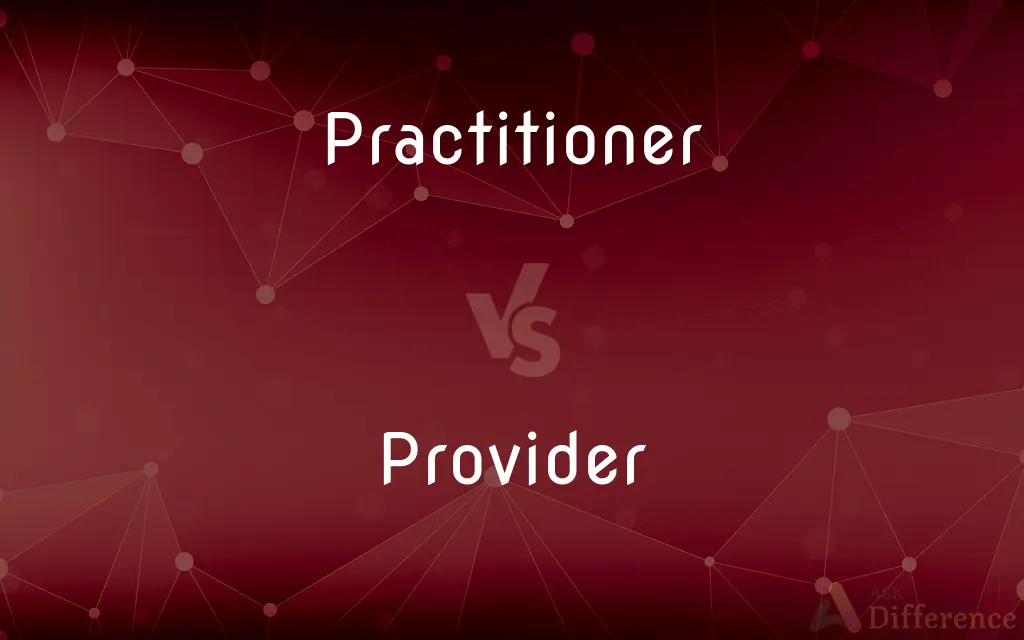Practitioner vs. Provider — What's the Difference?
By Maham Liaqat & Urooj Arif — Updated on March 28, 2024
A practitioner is a professional engaged in a specific occupation, often in healthcare, while a provider refers to any entity offering services or goods.

Difference Between Practitioner and Provider
Table of Contents
ADVERTISEMENT
Key Differences
A practitioner typically refers to individuals professionally engaged in a particular field, especially in healthcare, such as doctors, nurses, and therapists. These individuals apply their specialized knowledge and skills directly in their work. On the other hand, a provider can be an individual or an organization that supplies services or goods. In the context of healthcare, providers include hospitals, clinics, and even the practitioners themselves, indicating a broader scope.
While the term practitioner often emphasizes the hands-on, personal delivery of services, especially in health and legal professions, provider encapsulates a wider range of entities that can deliver services or products. For example, a healthcare practitioner directly interacts with patients, whereas a healthcare provider can be an institution that facilitates such interactions without directly engaging in them.
In terms of professional focus, practitioners are generally considered experts within their specific field of practice, dedicating their efforts to the mastery of their profession. Conversely, a provider might not necessarily focus on one specific area of expertise but could offer various services or products across different fields, especially in a business or organizational context.
The relationship between a patient and a practitioner is typically characterized by direct, personal care and interaction, highlighting a service's qualitative aspects. In contrast, the relationship between a customer and a provider might be more transactional, focusing on the exchange of services or goods, often with an emphasis on quantity or availability.
Understanding the distinction between practitioner and provider is crucial in contexts where the type of service, the quality of care, or the nature of the professional relationship is important. For healthcare, distinguishing between the two can affect expectations regarding personal care, service scope, and the nature of the interaction.
ADVERTISEMENT
Comparison Chart
Definition
An individual professionally engaged in a specific occupation
An entity that offers services or goods
Context
Often healthcare, legal, and other professional services
Broadly used in healthcare, business, and service industries
Scope
Direct, personal delivery of services
Can include both direct and indirect delivery of services or goods
Professional Focus
Specific area of expertise
May offer a variety of services or products
Relationship with Clients
Direct and personal interaction
Can be transactional or institutional
Compare with Definitions
Practitioner
A professional who practices a specific occupation, often healthcare-related.
The nurse practitioner provided excellent care to her patients.
Provider
An entity or person offering services or goods.
The internet service provider promised high speeds.
Practitioner
Often implies licensure or certification in a profession.
Only a licensed medical practitioner can prescribe medications.
Provider
Emphasizes the act of supplying or making available.
The food provider catered to thousands during the event.
Practitioner
Directly involved in providing service to clients or patients.
The dental practitioner saw twenty patients today.
Provider
In healthcare, includes both facilities and individual professionals.
The provider network included both primary care physicians and specialists.
Practitioner
Engaged directly in the application of specialized knowledge.
As a legal practitioner, she spends a lot of time in court.
Provider
Can refer to organizations such as hospitals or clinics.
The healthcare provider was recognized for its exceptional patient care.
Practitioner
Individual with advanced expertise in a particular field.
The acupuncture practitioner had many years of experience.
Provider
Broadly encompasses individuals and businesses in service sectors.
As a childcare provider, the company offered various programs for different age groups.
Practitioner
One who practices something, especially an occupation, profession, or technique.
Provider
A person or thing that provides something
A leading provider of personal financial services
Practitioner
A person who practices a profession or art, especially law or medicine.
Provider
One who supplies a means of subsistence
Parents who were good providers.
Practitioner
One who does anything customarily or habitually.
Provider
One that makes something, such as a service, available
Primary health care providers.
Practitioner
(dated) A sly or artful person.
Provider
One who, or that which, provides a service, commodity, or the means for subsistence.
Practitioner
One who is engaged in the actual use or exercise of any art or profession, particularly that of law or medicine.
Provider
One who provides, furnishes, or supplies; one who procures what is wanted.
Practitioner
One who does anything customarily or habitually.
Provider
Someone whose business is to supply a particular service or commodity
Practitioner
A sly or artful person.
Provider
Someone who provides the means for subsistence
Practitioner
Someone who practices a learned profession
Common Curiosities
Why is it important to distinguish between practitioners and providers in healthcare?
Distinguishing between practitioners and providers is important for understanding the scope of services offered, the nature of care received, and the type of professional relationship involved, which can influence patient expectations and satisfaction.
Can a practitioner also be a provider?
Yes, in contexts like healthcare, a practitioner (e.g., a physician) can also be considered a provider if they offer medical services or care directly to patients.
How does the role of a practitioner impact patient care?
The role of a practitioner is critical in patient care, as it involves direct, personal interaction and the application of specialized skills and knowledge to address individual health needs.
What kind of services do providers offer outside of healthcare?
Outside of healthcare, providers offer a wide range of services, including utilities, education, childcare, and many others.
What distinguishes a healthcare practitioner from a healthcare provider?
A healthcare practitioner is a professional who directly delivers care, such as doctors and nurses, while a healthcare provider can be either an individual healthcare professional or an organization like a hospital that offers healthcare services.
Is a provider always a large organization?
No, a provider is not always a large organization; it can also refer to individual professionals or small businesses that offer specific services or goods.
Are all practitioners licensed?
While most practitioners, especially in healthcare and legal fields, are required to be licensed or certified, the specifics can vary by profession and jurisdiction.
Can the quality of service differ between practitioners and providers?
The quality of service can differ due to the personalized care from practitioners based on their expertise, whereas providers, especially larger organizations, might offer a broader range of services with varying levels of personalization.
How does one become a practitioner in a professional field?
Becoming a practitioner typically requires specialized education, training, and obtaining licensure or certification in the respective field.
How can consumers evaluate the quality of practitioners and providers?
Consumers can evaluate quality through certifications, reviews, outcomes data, and regulatory compliance, among other criteria.
Can a business be considered a provider if it sells products?
Yes, a business that sells products is considered a provider, as the term broadly encompasses entities that offer goods or services to the public.
How do payment models for practitioners and providers differ?
Payment models can vary widely, with practitioners often receiving compensation based on services rendered or via employment by providers, while providers might charge based on services, contracts, or through insurance models.
Do practitioners work independently or for providers?
Practitioners can work both independently and as part of organizations (providers), depending on their profession and the nature of their practice.
What role do providers play in the healthcare system?
Providers play a crucial role in the healthcare system by facilitating access to a range of healthcare services and resources, including direct patient care, diagnostic services, and treatment facilities.
What trends are influencing the roles of practitioners and providers today?
Trends include increased integration of technology in service delivery, a greater focus on patient-centered care, and evolving healthcare models that impact how practitioners and providers operate within the system.
Share Your Discovery

Previous Comparison
Windbreak vs. Shelterbelt
Next Comparison
Exportation vs. ExportingAuthor Spotlight
Written by
Maham LiaqatCo-written by
Urooj ArifUrooj is a skilled content writer at Ask Difference, known for her exceptional ability to simplify complex topics into engaging and informative content. With a passion for research and a flair for clear, concise writing, she consistently delivers articles that resonate with our diverse audience.















































